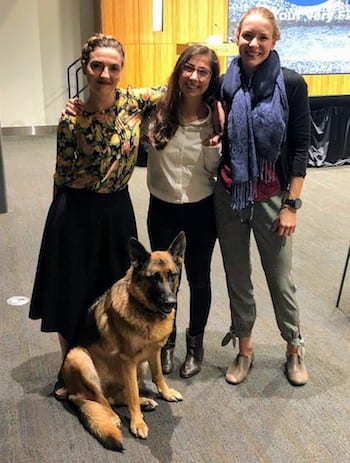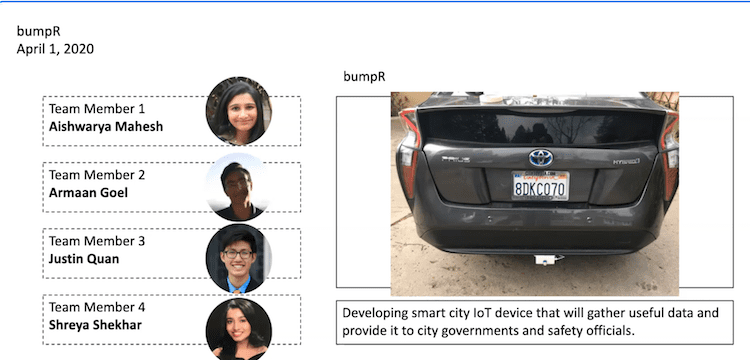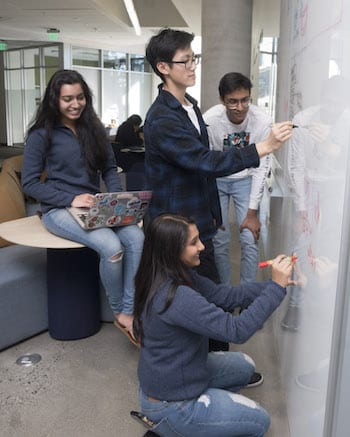Note: Haas News is following two of this year’s teams participating in LAUNCH, an accelerator for University of California startup founders that has helped create more than 200 companies since 1999. The teams are gearing up for the Demo Day final on May 1, when they’ll pitch their ideas to VCs and angel investors and compete for $25,000 in funding. This year the teams face an extra challenge: launching a startup at a time when the world has been turned upside down by the coronavirus pandemic.
If there’s one thing this year’s LAUNCH teams have had to learn overnight, it’s the value of flexibility.
Leading the LAUNCH teams through all of the ongoing uncertainty is Rhonda Shrader, executive director of the Berkeley Haas Entrepreneurship Program, who quickly shifted LAUNCH online, where the teams met on Zoom last Wednesday to share updates at the last webinar before the semifinals.
Dispatch Goods, for one, detailed its pivot from a reusable food container business for restaurants to a zero-waste co-op called Project Clean that fills recycled plastic bottles with hand sanitizer made by San Francisco-based distillery Seven Stills.
Dispatch CEO Lindsey Hoell, MBA 21, said the team’s shift to provide free hand sanitizer to homeless shelters, nursing homes, and low-income communities, has proven “a big saving grace.” “This has given us a reason to keep moving after a horrible disruption to our business model,” she said. “Sometimes you just have to keep active, engaged, and on the mission, so you can weather the storm.”
SuperPetFoods and BumpR, teams Haas News has followed since the start of LAUNCH in March, shared their own COVID-19 challenges on the call as they continue on their startup journeys.
SuperPetFoods

Sticking to the plan: Since their last meeting, the team—María (Mar) del Mar Londoño, MBA 21, Thais Esteves, MBA 21, and Gina Myers, MS 20 (bioengineering), who is also a chef—finalized their recipe for dehydrated pet food. The food is made from black soldier flies (Hermetia Illucens) and Mar plans to produce it in Colombia, where her family has a farm in the coffee-growing region (and she’s surrounded by more than 15 dogs). The black soldier fly is capable of converting food waste into high-quality protein and fat with incredible efficiency, with an undetectable carbon footprint, she said. Now, they are looking closely at how to cut the cost of production, which is high, and studying their potential profit margins by benchmarking against market competitors.

Eye-opening data: Mar, who represented the team on the webinar Wednesday, said COVID-19 dashed her plan to do many customer interviews in person. So she shifted online, surveying 300 people on Reddit. About 41% responded positively to the idea of using insects as pet food (73 percent were either positive or neutral). Mar also discovered that vegans are a possible niche market, as they were open to the idea of feeding insects to their pets.
Her initial fear that people would prefer dog food made in the U.S., sourced locally, instead of in Colombia, turned out to be unfounded, which was a relief. “I have the contacts there, the knowledge of how to run a business there and the manufacturing costs are way, way lower,” she said. From 11 interviews, the team discovered that they needed to do more to convince and educate pet owners of the safety and nutrition level of pet food made from insects.
Seed funding challenges: Mar applied for a grant from Arrow Capital, the student-run investment fund, but the fund recently announced it was shutting. “We’ll have to look for more alternatives,” she said. She’ll be soon competing as a finalist for the 2020 Rabobank-MIT Food and Agribusiness Innovation Prize, as well as in the LAUNCH final, which could net the startup $25,000. Mar asked Rhonda for advice about presenting the company to judges. She advised against a graphics-heavy presentation. “One trend I have hated over the past couple of years is “entrepreneur-tainment,” Rhonda said. “Images are not what LAUNCH is about.” Judges want to look under the hood, she said, so weave metrics into the company’s story and make sure to present a strong narrative.
BumpR

Challenges for BumpR: Responding to new campus COVID-19 rules, the undergraduate founders of BumpR —Armaan Goel, Aishwarya (Ash) Mahesh, Shreya Shekhar, all M.E.T. 23 (Management, Entrepreneurship & Technology); and Justin Quan, BS 23 (Electrical Engineering & Computer Science), — scrambled to move out of their dorms. Their move came at the same time as LAUNCHathon, a part of LAUNCH when participants across campus volunteer their skills to help other teams fulfill one item on their wish list. At the same time, the team decided to shift their business model. “Powered by instant ramen, we completed the move out from our dorms as well as our pivot,” Justin said.

The pivot: BumpR started out building a cloud-based back end for targeted advertising displays. The team decided that an ad tech company wouldn’t work, so they abandoned the original mission and started building a Smart Cities plan to help governments collect data more efficiently. In recent days, Justin and Ash started reaching out to city and public safety officials to collect data. Justin interviewed officials in Saratoga and Los Gatos by phone, while Ash scheduled phone calls with city officials in L.A. county, where she lives. They found that cities often hire traffic engineers to collect data before building structures like parking garages and public transit stations, which is an expensive and tedious process, or they rely on published general traffic data, which isn’t always accurate nor specific to individual cities. Both saw a problem that team BumpR can solve.
Validating the idea: Justin, who had just finished a computer science midterm moments before, and Ash asked for feedback from their instructor Rhonda. Their new business model centers on producing an inexpensive Internet of Things (IoT) device, similar to a city-registered electronic carpool sticker, that rideshare drivers mount on their cars to easily collect data over geographic areas. Revenue would come from payments for access to

datasets. The team said the devices could be used by planning departments, law enforcement, and fire departments.
Sharpening the focus: Rhonda asked team members to better define the key benefits to customers. Does BumpR help cities save money? Does it save time or improve quality of life? The team needs to figure out how much that savings would need to be to make the offering a priority for cities, she said. She also told them to not overlook the social part of their offering: the idea of making people look good to their bosses. “Test that with them. Ask them: how would this change your life if you had more accurate data that costs less? Think about that as you go out to do interviews,” she said.